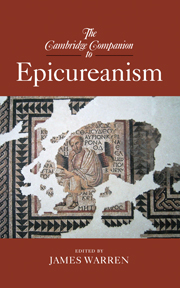Book contents
- Frontmatter
- Introduction
- 1 The Athenian Garden
- 2 Epicureanism in the Roman Republic
- 3 Epicureanism in the Roman Empire
- 4 Epicurean atomism
- 5 Epicurean empiricism
- 6 Cosmology and meteorology
- 7 Psychology
- 8 Action and responsibility
- 9 Pleasure and desire
- 10 Politics and society
- 11 Epicurean philosophy of language
- 12 Philosophia and technē: Epicureans on the arts
- 13 Removing fear
- 14 Epicurean therapeutic strategies
- 15 Epicureanism in early modern philosophy
- Bibliography
- Index
10 - Politics and society
Published online by Cambridge University Press: 28 September 2009
- Frontmatter
- Introduction
- 1 The Athenian Garden
- 2 Epicureanism in the Roman Republic
- 3 Epicureanism in the Roman Empire
- 4 Epicurean atomism
- 5 Epicurean empiricism
- 6 Cosmology and meteorology
- 7 Psychology
- 8 Action and responsibility
- 9 Pleasure and desire
- 10 Politics and society
- 11 Epicurean philosophy of language
- 12 Philosophia and technē: Epicureans on the arts
- 13 Removing fear
- 14 Epicurean therapeutic strategies
- 15 Epicureanism in early modern philosophy
- Bibliography
- Index
Summary
Epicurean thoughts about politics contrast sharply with those of other prominent Greek and Roman philosophers. Plato, Aristotle and the Stoics agree that human beings are naturally political animals, by which they mean that to realize fully our natural capacities and be perfectly successful as human beings, we need to contribute to the polis. Accordingly, they believe that humans should start a family and should, at least if circumstances are favourable, engage in politics. These philosophers also agree that justice exists by nature and not by convention, by which they mean that standards of right and wrong for social life do not depend upon any particular agreements or customs. The Epicureans differ. They discourage starting a family and engaging in politics, and they deny that justice exists by nature. It would be a mistake, however, to infer that Epicureanism is apolitical. First, these sweeping contrasts need some qualification: the Epicureans do not absolutely reject ordinary politics and do not think that justice is whatever a society decides it is. Second, and more importantly, the Epicureans' pursuit of pleasure requires that they cultivate their own just community of friends, apart from the madding crowd.
- Type
- Chapter
- Information
- The Cambridge Companion to Epicureanism , pp. 179 - 196Publisher: Cambridge University PressPrint publication year: 2009
- 41
- Cited by

